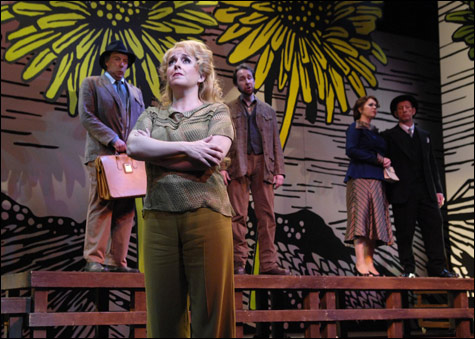
THE BARTERED BRIDE: It was disconcerting done in English, but the singers were mostly excellent, and Gil Rose led the terrific orchestra with panache and Bohemian lilt. |
It's been a long time since Bostonians had the chance to see the most popular Czech opera, Bedrich Smetana's The Bartered Bride, but Opera Boston followed its electrifying run of Shostakovich's The Nose with this tuneful folk opera and gave it a sweet and very likable production. A few different decisions might have made it even sweeter and more likable. The Nose was sung in the original Russian; The Bartered Bride was done in English, though the clunky translation ("He'll rue the day!") didn't begin to capture the Czech rhythms of the music. Then stage director/choreographer Daniel Pelzig decided that, since the language was English, why not set the action in a place where English is spoken? Like Spillville, Iowa. Dvorák visited the Czech community there, and that's where he composed his American Quartet.
This idea sounded better on paper than it turned out. The plot, like some of the music (from the fizzy overture to the patter songs), is proto–Gilbert & Sullivan, with its tickling logical/legalistic convolutions. The more "realistic" the approach, the less believable the comedy. The Iowans in Pelzig's conceit are enterprising enough to start a brewery right after Prohibition is repealed, so they're unlikely to enter into contracts in which brides are promised as repayments for debts. The neverland of Ruritanian operetta might have let us to suspend our disbelief more easily. (Smetana had first conceived his work as an operetta.) A colorful Czech village might have also reflected the folk elements of the score more vividly than costume designer Jennifer Caprio's repressed Midwest beiges and umbers, or set designer Michael B. Raiford's Rockwell Kent–ish backdrop woodcut of black-and-white rolling pastures (though he cleverly turned a table into a fence and then into a dock). When the dazzling circus people arrive in the third act, everything suddenly looked like the music we were hearing.

Still, I enjoyed myself. Gil Rose led the terrific orchestra with panache and Bohemian lilt. Pelzig choreographed the extended musical interludes for six gifted and witty young dancers from the Boston Conservatory; the rollicking parade of the circus folk, spinning and tumbling, brought down the house. And the mostly excellent singers all seemed comfortable in their characters. In the title role of the bride whose fiancé seems to have sold her for $300, Jennifer Aylmer has a gleaming soprano and seemed right at home on stage, conveying Marenka's smarts as well as her tender feelings. (Too bad the words to her poignant aria — "How dark the day that dawned so bright" — were more Iolanthe than Iowa.) Her beloved Jeník, bright-voiced tenor Patrick Miller, strained for his high notes but was an appealing if not exactly subtle hero. Superb tenor Keith Jameson was both touching and funny as the tongue-tied, stuttering Vasek and stole every scene he was in.
Some outstanding singers were no surprise to Bostonians. Baritone James Maddalena (the original Nixon in Nixon in China) is also a superbly understated comedian, with some astonishing low notes; he had a field day as the shyster marriage broker Kecal. Tenor Frank Kelley, with flaming handlebar moustache, was a brilliant Circus Master, and he delivered the best line in the translation, describing the alluring Esmeralda (the alluring Sara Heaton) as "titillating attention with tarantellas on the tightrope" (anticipating not only G&S but also the fast-talking auctioneer in Stravinsky's The Rake's Progress). And another of Boston's best baritones, David Kravitz, caught Marenka's strapped father in both his narrow- and his open-mindedness. Even more praiseworthy was the quality of the numerous duets, and the comfortable intimacy both Pelzig and Rose appeared to have inspired.
Twenty-five years ago, Sir Colin Rex Davis stepped down after his dozen years as the Boston Symphony Orchestra's principal guest conductor. He was so popular, his fans hoped he'd become the BSO music director. Bostonians still love him. He closed the BSO season with a pretty but oddly bland performance of Mozart's magnificent C-major Piano Concerto, No. 25, with British pianist Imogen Cooper (whom I've heard play before with more point and feeling), and then a blow-out version of one of his specialties, Berlioz's Te Deum, a huge hymn inspired by the memory of Napoleon, for double chorus (the Tanglewood Festival, singing by heart and with heart), children's chorus (PALS, in one of its most vivid performances), organ (John Finney pulling out all the stops), and tenor (the Met's wonderful Matthew Polenzani, brother of popular Boston indie folk musician Rose Polenzani).
The Te Deum is far from Berlioz's most ravishing piece. Even many Berliozians find it bloated and aggressively loud. (Here there were five cymbals plus horns, trumpets, trombones, tuba, and ophicleide going full blast.) Yet it's pure Berlioz, tremendously powerful in the way climax builds upon climax — a quality Sir Colin, at 81, has mastered — and in its sudden moments of introspection, a quality Polenzani, with his enormous dynamic range, emotional honesty, and naturally beautiful tone, has also mastered. His solo was the warmest, most quietly radiant passage in the entire performance.